On October 28, Rajasthan police booked Shazia Riyaz, a Pakistani woman residing in India since 1985, for forging Aadhaar and PAN cards to secure her stay in the country. The mother of four, who came to India nearly four decades ago and married an Indian man, had been living with her husband’s family in Jaipur’s Jaisinghpura Khor area, where she integrated into the local community.
Police said the investigation was initiated following intelligence inputs, leading to the discovery that Shazia had obtained Indian identification documents through illegal means. “A case has been registered against her for forgery, and further investigations are ongoing,” confirmed Jaisinghpura Khor SHO Rajesh Meena.
What says the FIR?
An FIR (No. 429/2024) was officially registered in this case on October 26 at the Jaisinghpura Khor Police Station, with SHO Rajesh Meena filing the report.
In the FIR filed by SHO Meena, an investigation was launched against Shazia, who forged several Indian documents, including Aadhaar and PAN cards, to reside in India. The FIR outlines a series of official correspondences that led to the probe, initiated based on intelligence inputs from the Deputy Commissioner of Police, Jaipur North, as well as other senior officials.
The investigation began following a letter (No. 1008, dated July 20, 2024) from the Deputy Commissioner of Police. It highlighted potential irregularities in the documentation submitted by Shazia Riyaz, who has resided in India with her husband and family since 1985. This letter was supported by additional directives from the Police Commissioner, the CID, and the Foreign Registration Officer, requesting a thorough examination of Shazia Riyaz’s identification documents.
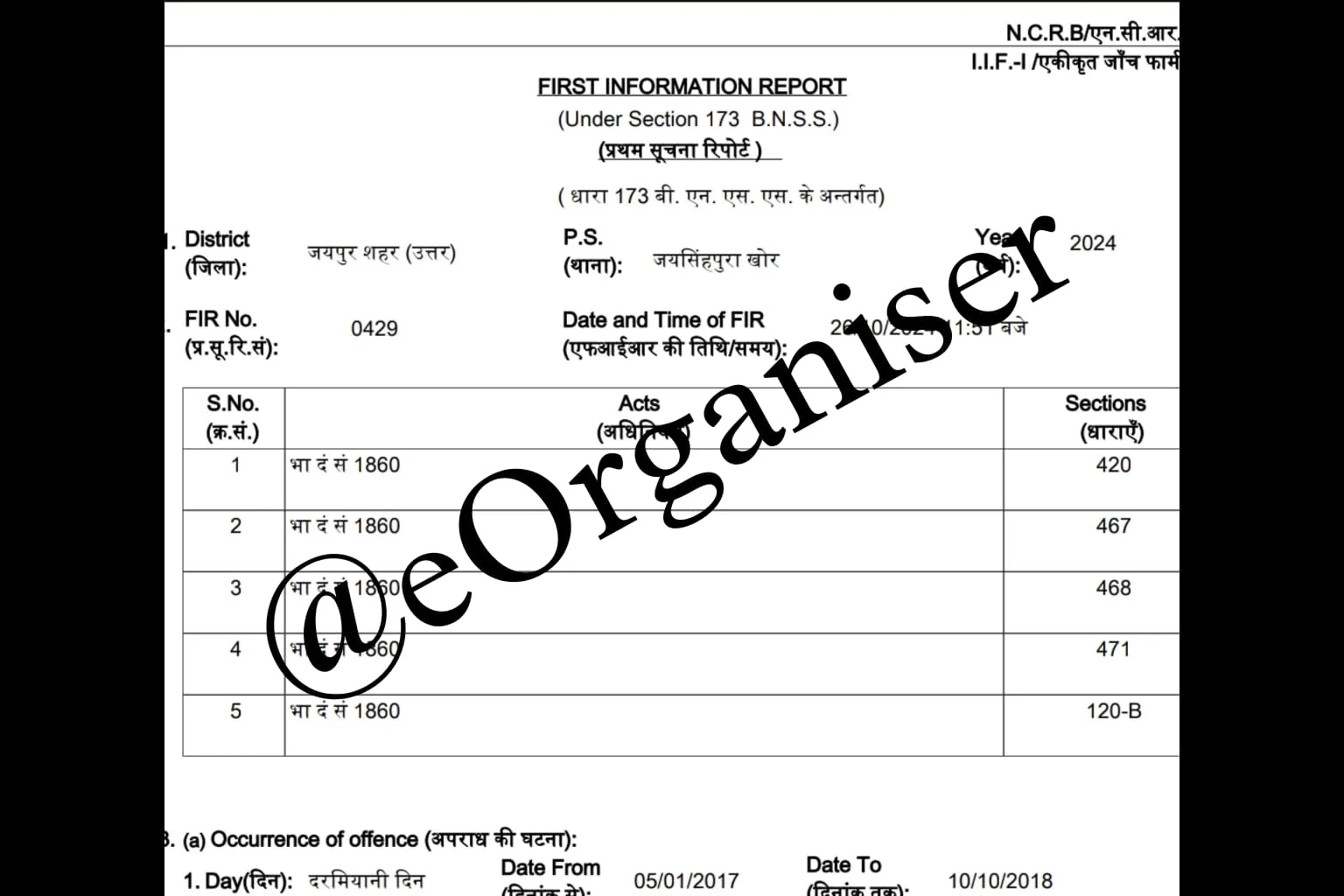
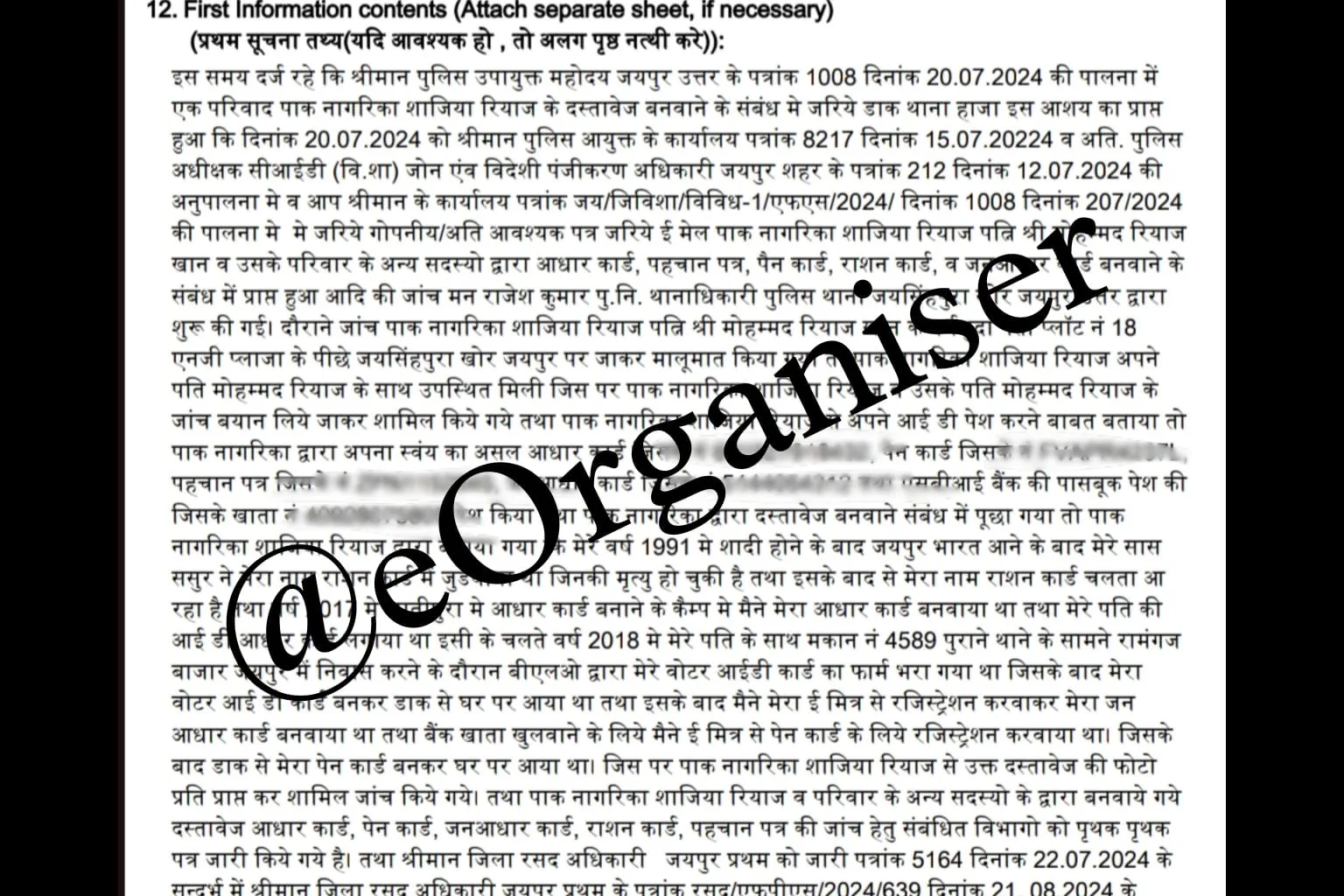
Sub-Inspector Rajesh Kumar initiated the probe by visiting Riyaz’s registered address at Plot No. 18, located behind NG Plaza in Jaisinghpura Khor, Jaipur. There he found Shazia Riyaz with her husband, Mohammad Riyaz. Shazia provided original identification documents, including her Aadhaar card (number: 69192791XXXX), PAN card (FVAPR4XXXX), Jan Aadhaar card (514405XXXX), and her SBI bank passbook. She disclosed that after her marriage in 1991, her name was added to her in-laws’ ration card, and she obtained an Aadhaar card at a camp in 2017 at a government camp in Khatipura, where her husband’s identity was linked to her registration. She further explained that her voter ID card was issued in 2018 while she was residing with her husband in Ramganj, Jaipur, and her PAN and Jan Aadhaar cards were created through e-Mitra services.
Further scrutiny was applied to these documents. Letters were issued to respective authorities—including the Department of Information Technology and Communication, the Election Office, and the Jan Aadhaar Authority—to verify the authenticity of the documents.
However, records from the voter list revealed inconsistencies: Shazia’s voter ID was missing, and multiple names of her family members were either absent or had been deleted from the database. Efforts to verify her PAN card and other documents remain ongoing.
Preliminary findings suggest that the documents were improperly obtained to secure Indian citizenship.
Officials are also investigating possible negligence by government employees who facilitated the issuance of these documents.
Based on the evidence, a case has been registered against Shaiza under IPC Sections 420 (cheating), 467 (forgery of valuable security), 468 (forgery for the purpose of cheating), 471 (using forged documents), and 120B (criminal conspiracy).
The case has now been handed over to Sub-Inspector Satishchand for further investigation, with Jaipur North’s Deputy Commissioner of Police overseeing the process. Continuous efforts are underway to gather additional documentation, and authorities are intensifying scrutiny on this matter, which raises concerns over systemic vulnerabilities in identity verification processes.
Similar cases from the past
This case echoes other recent incidents involving forgery for immigration purposes. Earlier this year, 24-year-old Sanam Khan, also known as Nagma Noor Maqsood, was arrested by Thane Police for forging documents, including using a false name on her Aadhaar card to obtain a Pakistani visa to meet her husband. Married online, Nagma sought to reunite with her husband in Pakistan, but her documentation was flagged during visa processing.
“Nagma had altered her identity to ‘Sanam Khan Rukh’ on her passport to facilitate her travel to Pakistan. Following an investigation, she was taken into custody by Vartak Nagar Police in Thane,” a police official was quoted in media.
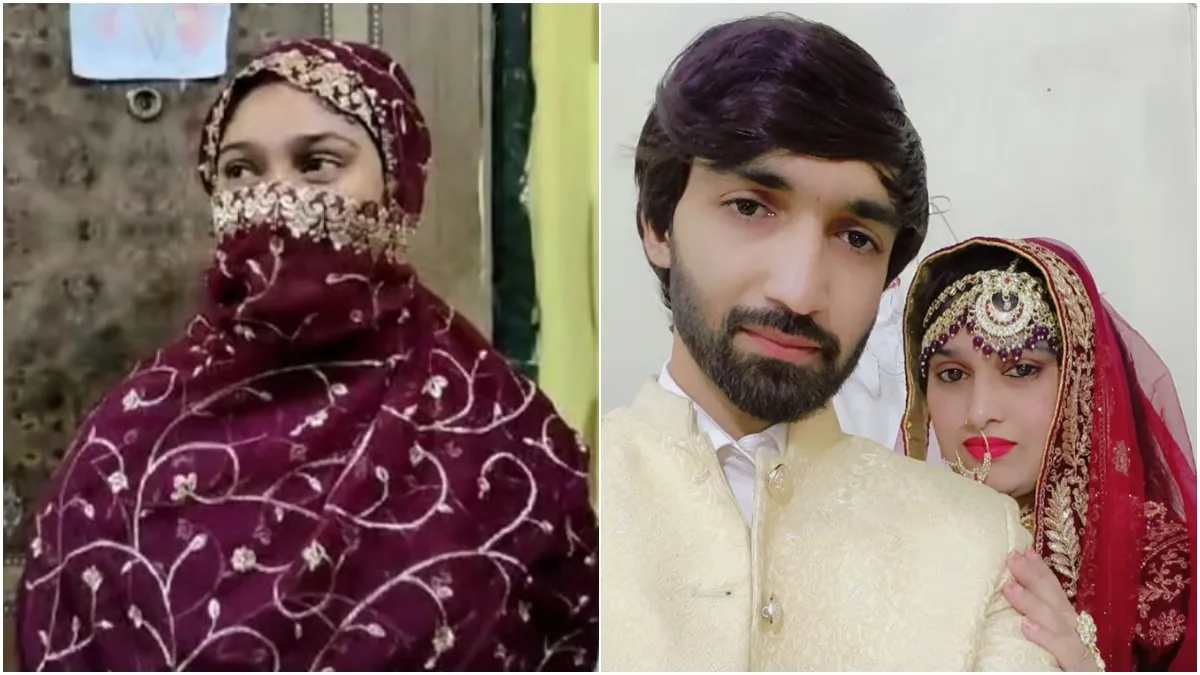
Nagma has denied the allegations, insisting that her name change was done legally in 2015 and that she followed due process for her passport and visa application. “If an inquiry is needed, I am open to it, but I have complied with the legal methods,” she told the media.
In a similar incident, four Pakistani nationals residing on the outskirts of Bengaluru under false identities were arrested on October 1, 2024. The accused, identified as Rashid Ali Siddiqui (48), his wife Ayesha (38), and her parents Hanif Mohammed (73) and Rubina (61), had been living in Rajapura village, posing as the “Sharma” family with aliases Shankar Sharma, Asha Rani, Ram Babu Sharma, and Rani Sharma.
During initial questioning, Siddiqui, who went by Shankar Sharma, revealed that he had been in Bengaluru since 2018. He even presented Indian passports and Aadhaar cards for the family, which bore Hindu names. However, the police were taken aback upon entering the house and noticed a wall adorned with the words “MEHDI FOUNDATION INTERNATIONAL JASHAN-E-YOUNUS.” Additional evidence included photographs of Islamic clerics.
Under further interrogation, Siddiqui, alias Shankar Sharma, confessed that they were originally from Pakistan—he was from Liaquatabad in Karachi, while his wife and her family hail from Lahore. Siddiqui explained that he had married Ayesha in an online ceremony in 2011 while she was in Bangladesh with her family. Due to rising religious persecution in Pakistan, he had moved to Bangladesh where he served as a preacher, financially supported by the Mehdi Foundation.
In 2014, however, he faced renewed threats in Bangladesh, prompting him to reach out to an Indian contact, Parvez, associated with the Mehdi Foundation. Through Parvez’s assistance, Siddiqui and his family crossed into India illegally via Malda in West Bengal, with the help of agents.
After initially settling in Delhi, the family secured forged Aadhaar cards, passports, and driving licenses under the new surname “Sharma.” Siddiqui began preaching on behalf of the Mehdi Foundation in Delhi.
In 2018, after meeting Wasim and Altaf, Bengaluru residents he encountered on a trip to Nepal, Siddiqui decided to move to Bengaluru, where he was encouraged to preach. Altaf arranged housing for the family, while the Mehdi Foundation funded Siddiqui’s programs on Alra TV, where he promoted Islamic teachings. Additionally, Siddiqui’s in-laws opened local bank accounts, and he began supplying oils to garages and selling food items in the city.
The police have filed a case against Siddiqui and his family under sections 420 (cheating), 468 (forgery for the purpose of cheating), and 471 (using as genuine a forged document) of the Indian Penal Code, along with sections of the Passport Act.
The rising number of such cases has sparked renewed public interest, particularly in light of the highly publicised case of Seema Haider, a Pakistani woman who entered India earlier this year to join her Indian partner, whom she met online. Haider’s case, which has garnered media attention for the past few months, has stirred debates about cross-border relationships and the protocols for securing legal residence in India. Her entry was reportedly facilitated through Nepal, bypassing standard immigration processes, which has raised questions about border security and the consequences of unauthorised entries.
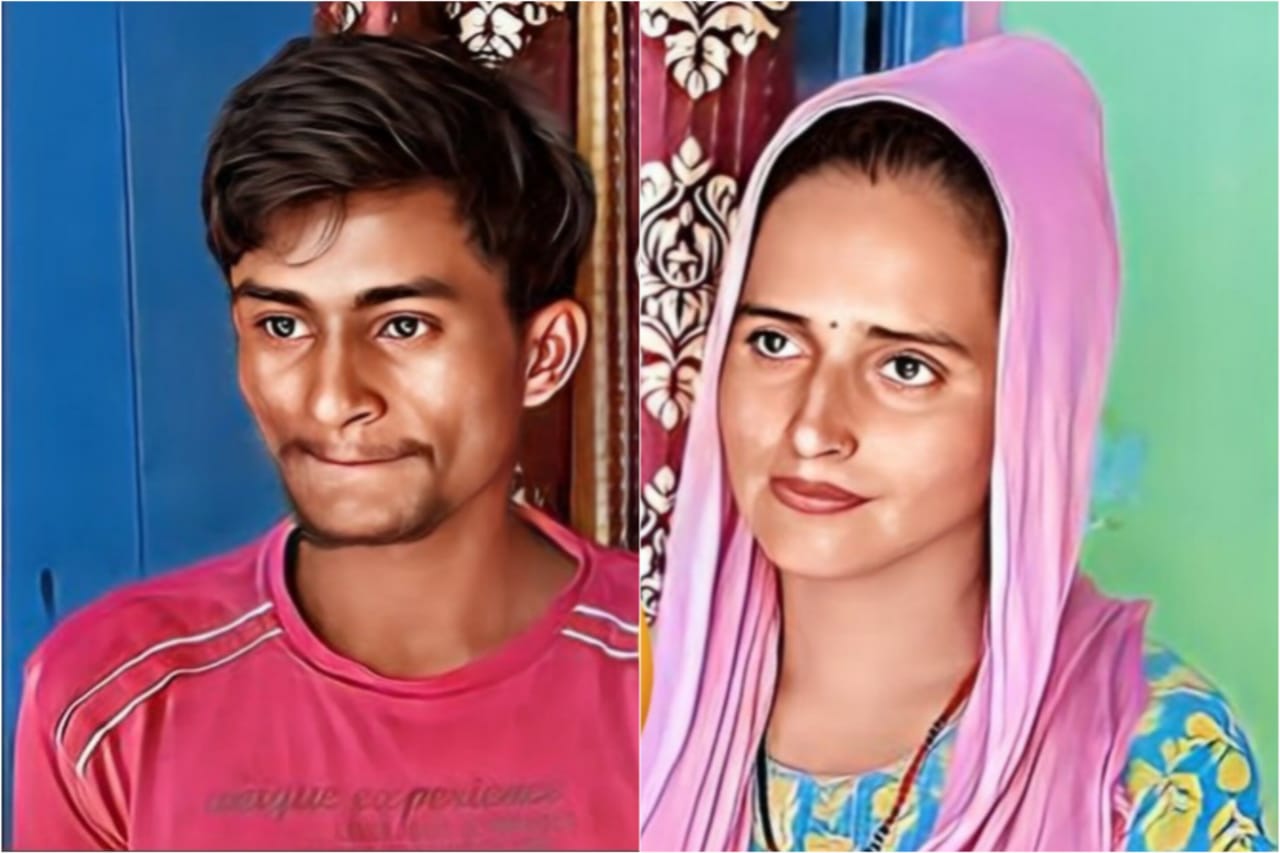
Authorities are now examining the broader implications of these cases on India’s immigration and document verification systems. In recent years, demands for stricter vetting processes for foreign nationals marrying Indian citizens have intensified.
Meanwhile, the police continue to investigate Shazia Riyaz’s case, which has added a new dimension to the ongoing discourse on citizenship and legal residency for illegal immigrants in India.


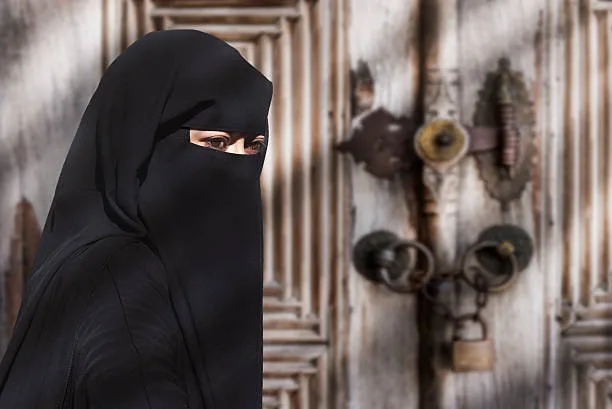
















Comments